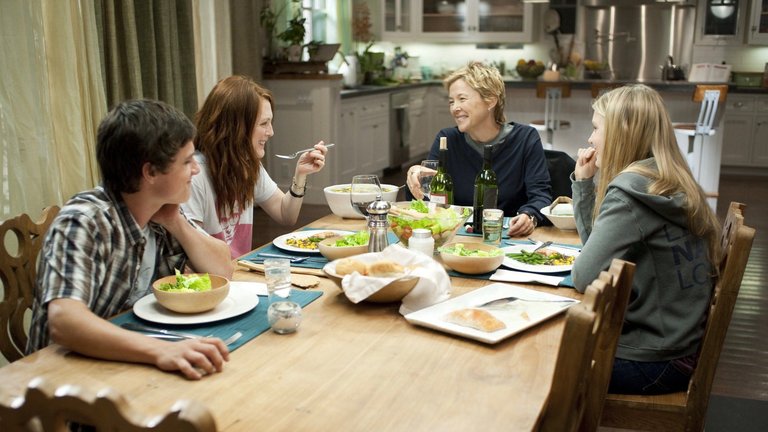Film Review: The Kids Are All Right (2010)

The latest US presidential election might have cast doubt on Hollywood's ability to influence public opinion, but it's worth remembering that in the not so distant past, Hollywood was adept at shaping audience perceptions and encouraging social change. One such example is the gradual acceptance of "alternative lifestyles" that were once considered taboo but are now celebrated as integral to society. A notable film that contributed to this cultural shift is The Kids Are All Right, a 2010 drama directed by Lisa Cholodenko.
The film is set in Los Angeles and revolves around the family of Dr. Nicole "Nic" Allgood (played by Anette Benning), an affluent physician who, along with her lesbian lover Jules Allgood (played by Julianne Moore), has lived a happy life for the past two decades. They have children through artificial insemination from the same donor - Nic has a daughter named Joni (played by Mia Wasikowska), while Jules has a son named Laser (played by Josh Hutcherson). As Joni is about to leave for college and Jules considers pursuing a career in landscaping, tensions rise within the household. Laser, feeling confused, decides to seek out his biological father, and his quest, reluctantly joined by Joni, leads them to Paul Hatfield (played by Mark Ruffalo), a free-spirited and charming owner of an organic food restaurant. Paul is delighted to discover his offspring and attempts to connect with the family, leading to unexpected consequences after Jules finds him sexually attractive.
Released approximately five years after Brokeback Mountain, Cholodenko’s film continues the trend of promoting acceptance of homosexuality in Hollywood but does so through a different lens. Rather than depicting the tragic consequences of anti-gay bigotry, the film portrays homosexuals as capable of having happy marriages and families, just like heterosexuals. Cholodenko, who is lesbian, co-wrote the script with Stuart Blumberg, drawing partly from her own experience as a same-sex parent.
Despite being made on a low budget, The Kids Are All Right performed well at the box office and received almost unanimous acclaim from critics, earning several awards, including a Golden Globe for Best Musical or Comedy. However, this success can be attributed more to the film's subject matter and its progressive themes than to its artistic quality. While many critics praised its handling of contemporary issues regarding sexuality and family structure, some argue that the film's execution falls short of its ambitious goals. The performances are commendable—particularly Bening and Moore’s portrayals of a long-term couple navigating mid-life challenges—but the script occasionally struggles to maintain dramatic tension.
Much of the praise directed towards The Kids Are All Right is indeed well-deserved, especially concerning its diverse cast that effectively evokes sympathy for its characters. Mark Ruffalo’s performance as Paul adds an engaging layer to the narrative; his charm and carefree attitude create an intriguing counterbalance to Nic’s serious disposition and Jules’ free-spirited nature.
Nonetheless, the screenplay grapples with a notable deficiency in dramatic conflict within what is ostensibly a story about a happy lesbian relationship. In an effort to inject tension into the narrative, it resorts to contrived plot devices that feel unconvincing. For instance, Nic and Jules intentionally chose to have children from the same sperm donor—a decision that foreshadows potential complications in their family life. The portrayal of their relationship entering a "thrill being gone" phase resembles sitcom clichés rather than genuine emotional struggles. Additionally, Jules’ willingness to abandon her long-standing lesbian identity for a handsome straight man raises concerns; some critics have even suggested this reflects underlying homophobic biases.
Furthermore, the film's setting within an affluent white upper-class milieu limits its dramatic scope and may alienate viewers grappling with more pressing socioeconomic issues. By focusing on characters who inhabit such privileged spaces, The Kids Are All Right risks presenting an overly sanitized view of family life that does not resonate with broader audiences facing real-world challenges.
The Kids Are All Right is a competently directed and well-acted film that reflects shifting attitudes towards homosexuality while simultaneously revealing the limitations inherent in its narrative approach.
RATING: 5/10 (++)
Blog in Croatian https://draxblog.com
Blog in English https://draxreview.wordpress.com/
InLeo blog https://inleo.io/@drax.leo
Hiveonboard: https://hiveonboard.com?ref=drax
Rising Star game: https://www.risingstargame.com?referrer=drax
1Inch: https://1inch.exchange/#/r/0x83823d8CCB74F828148258BB4457642124b1328e
BTC donations: 1EWxiMiP6iiG9rger3NuUSd6HByaxQWafG
ETH donations: 0xB305F144323b99e6f8b1d66f5D7DE78B498C32A7
BCH donations: qpvxw0jax79lhmvlgcldkzpqanf03r9cjv8y6gtmk9